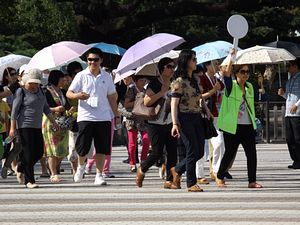In recent years, the Chinese government has been weaponizing outbound international travel of its citizens to punish other countries that behave in ways that it does not like. Taiwan has been at the forefront of this trend – this summer, the Chinese government announced that as of August 1, people from 47 Chinese cities can no longer travel independently to Taiwan. The move is seen as economic punishment for Taiwan’s President Tsai Ing-wen, reducing her chances of being re-elected in the 2020 presidential election.
But Taiwan is certainly not the only target of China’s weaponized travel policies. While the Chinese government has not outright banned travel to other specific countries, it has issued a “risk advisory” that discourage its citizens from visiting largely peaceful, wealthy states like Canada, Sweden, and South Korea during various political disagreements that arose over the last couple of years.
Discouraging outbound travel from China is perceived to be effective thanks to the ability of an ever-increasing number of spendthrift Chinese tourists boosting local economies wherever they go. Chinese tourists spent $288 billion abroad in 2018, responsible for a quarter of all global tourism revenues. The figure is expected to grow further to $365 billion by 2025. Other estimates predict the number of Chinese traveling abroad will double from the current 149.7 million in the 2020s as the percentage of Chinese citizens with a passport increase from 10 percent to 20 percent. Seeing such figures, it is no wonder that some countries are willing to appease the Chinese government to increase their intake of more Chinese travelers in the future.
However, such a sanguine view of unimpeded growth in Chinese outbound travel numbers ignores a fundamental political reality. Under the Xi Jinping administration, the Chinese government has increased efforts to prevent the dissemination of Western liberal ideas. Yet one of the prime ways for these Western ideas to be disseminated in China is through returning Chinese citizens who have traveled or studied abroad. For the Chinese government to ensure that “harmful” foreign values are not brought into Chinese political discourse, it makes enormous sense to not only make sure Chinese citizens do not acquire them at home from foreign individuals or media outlets, but also prevent them from getting “infected” while traveling to foreign lands and interacting with locals there.
As such, the Chinese government, to prevent Chinese citizens from learning unwanted Western liberal values abroad, could increasingly seek to limit the scope of Chinese outbound travel in the near future. On one hand, as is the case for Taiwan, independent travel, in which travelers have more opportunities to interact freely with locals, could be banned in favor of group travel that allows licensed and “politically correct” travel agencies to closely monitor travelers. On the other hand, the government could simply make the process of acquiring a passport more stringent, with ever higher education, income, and even professional requirements that make most of its citizens unqualified and ineligible for a passport. Using such methods, the government can better ensure that only those it wants to travel abroad can travel under circumstances that do not allow them to stray from the standard Chinese political discourse they hear at home.
When the Chinese government puts such preventive measures in place, the growth of Chinese outbound travel will undoubtedly suffer. After a certain segment of the Chinese middle class and elite become frequent international travelers, increase in Chinese outbound travel will flat-line as less cosmopolitan individuals with international political awareness will be prevented from freely traveling abroad despite having the disposable incomes to do so. The Chinese government recognizes that the country’s white-collared professionals and top businessmen think independently and need to be coopted through the ability to venture freely abroad. But the government will see the same being offered to the much less educated and worldly masses as a threat to political stability and the continuation of one-party rule.
Hence, countries that seek to draw more and more Chinese tourists should be realistic about the future prospects of Chinese outbound tourism. Even as these countries are compelled to toe the Chinese government’s line on many political issues, they may not get the fast-growing tourist revenues that they were hoping for by targeting Chinese tourists. Future restrictions on outbound travel by the Chinese government mean that even as the Chinese economy and average disposable income continue to grow, Chinese outbound tourism will not grow proportionally.
The limits of Chinese outbound travel also mean that the impact of the Chinese government’s weaponization of outbound tourism will remain limited. The simple fact is that domestic political restrictions require the Chinese government to ensure that foreign travel remains a privilege available to only a relatively small segment of the “high-end” population that is both capable of independent political thinking and tolerates the existing political framework in China. The government cannot risk the majority of less well-off citizens heading freely abroad, where they can pick up new ideas that stir up further grumblings at home. That fear on the part of the Chinese government will ensure that the majority of Chinese citizens will be kept from spending money abroad, not because of their lack of money to spend.
Xiaochen Su is a Ph.D. candidate at the University of Tokyo specializing in immigration issues. He previously worked in East Africa, Taiwan, South Korea, and Southeast Asia.

































